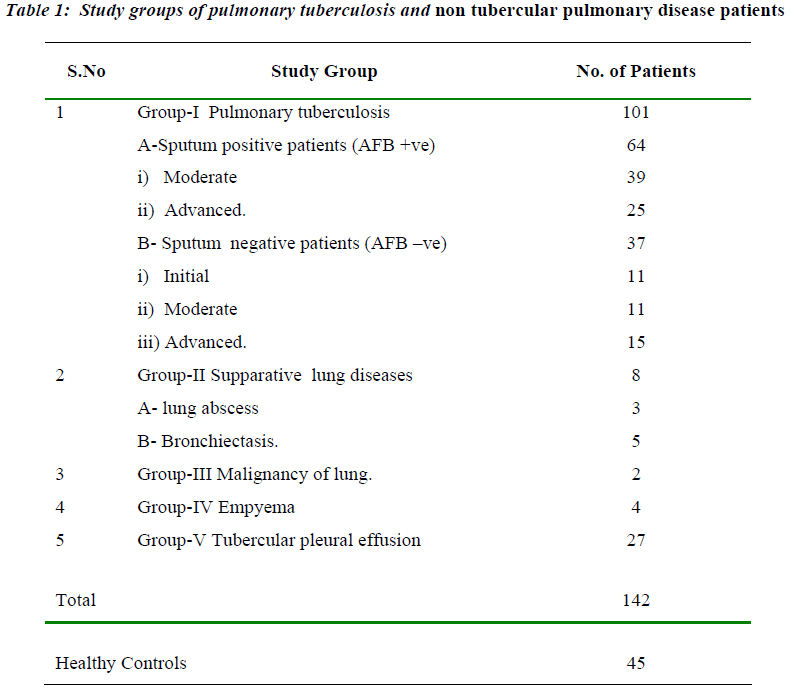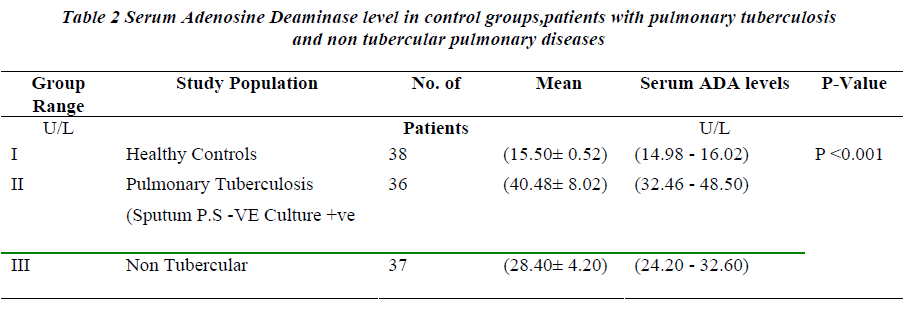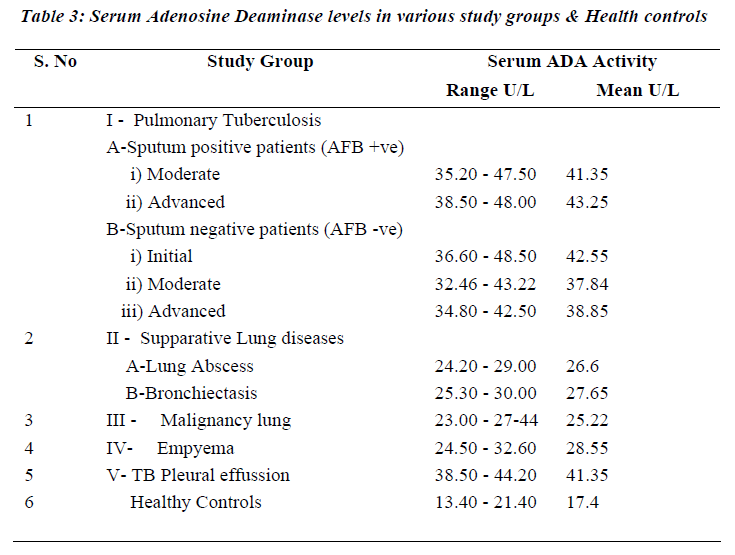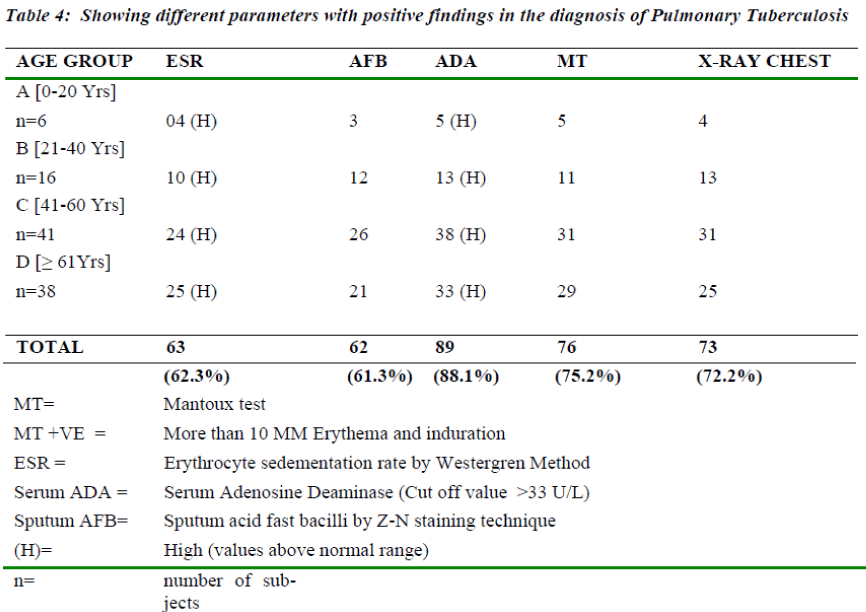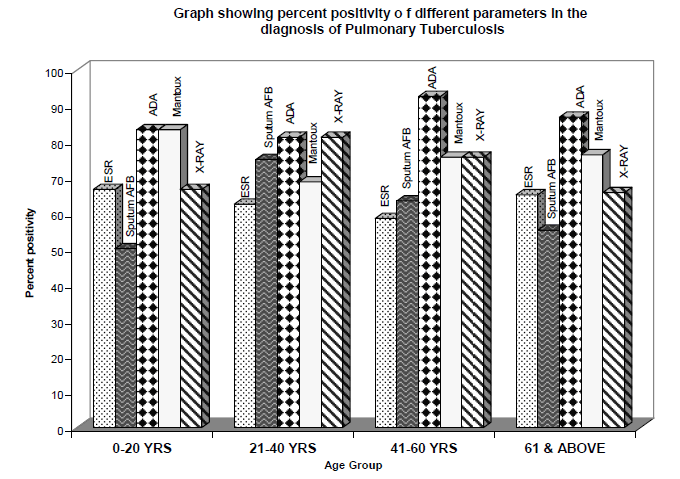ISSN: 0970-938X (Print) | 0976-1683 (Electronic)
Biomedical Research
An International Journal of Medical Sciences
- Biomedical Research (2010) Volume 21, Issue 2
A Comparative study and evaluation of serum adenosine deaminase activity in the diagnosis of pulmonary tuberculosis
1Department of Biochemistry, Navodaya Medical College, Raichur, India.
2Department of Microbiology, Navodaya Medical College, Raichur, India.
3Department of Biochemistry, AIMS, B.G.Nagar, Bellur, India.
- *Corresponding Author:
- K. Srinivasa Rao
Dept.of Biochemistry
Navodaya Medical college
Mantralayam Raod
Raichur-584103, India.
E-mail: srini.nmc@gmail.com
Accepted date: October 17 2009
The study was done to evaluate the ADA activity in the diagnosis of pulmonary tuberculosis and its relationship with clinical, radiological and laboratory parameters. The study was carried out on 142 patients suspected from various pulmonary disorders from July 2008 to January 2009. Forty five normal healthy individuals were included as control subjects for ADA evaluation. Four groups of patients namely A (0-20 yrs), B (21-40), C (41-60) and D (≥ 61 yrs) were formed and diagnosis was based on the x-ray Chest, Mantoux test, ESR, spu-tum AFB and Serum ADA level. The Sensitivity of various tests against ADA was done. In the diagnosis of Pulmonary tuberculosis, serum ADA showed high percent positivity of 88% followed by chest x-ray (76%), ESR (72%), sputum AFB (63%) and Mantoux Test (61%).Significantly high serum ADA level was reported in pulmonary tuberculosis cases compared to non tubercular pulmonary diseases. Sputum AFB negative pulmonary tuber-culosis cases have also shown elevated level of serum ADA at par with sputum AFB positive cases. In the present study serum ADA level in control group was 15.3 ± 0.23 U/L and cut off value was 33 U/L for diagnosis of pulmonary tuberculosis. As determination of ADA is not costly or time consuming, should be done routinely, particu-larly if the diagnosis of tuberculosis is in doubt, clinically suggestive but sputum AFB nega-tive cases and also to differentiate pulmonary tuberculosis from non tubercular pulmonary diseases.
Keywords
Serum ADA, Pulmonary Tuberculosis, Non tubercular pulmonary diseases
Introduction
Tuberculosis (TB) remains the single largest infectious disease causing high mortality in humans, leading to 3 million deaths annually, about five deaths every minute. Approximately 8-10 million people are infected with Mycobacterium tuberculosis every year [1]. Out of the total number of cases, 40 percent of the cases are accommo-dated in South East Asia alone. In India there are about 500,000 deaths occurring annually due to TB [2], with the incidence and prevalence being 1.5 and 3.5 millions per year. A positive AFB smear and /or culture of Mycobac-terium is the gold standard for the diagnosis of tuberculo-sis. Though smear positivity correlates well with infectiv-ity, much of the transmission occurs before the level of bacilli reach 104 per ml in the sputum. Infection is a sto-chastic process and certainly occurs from paucibacillary and smear negative cases which are more common in HIV seropositives [3].
Problem arises when sputum smear result is repeatedly negative for acid fast bacilli and to detect the TB bacilli microscopically, there should be at least 50,000 bacilli per ml of sputum. Culture for tubercle bacilli is a sophisti-cated and time consuming process. The TB bacilli grow slowly (generation time 14-15 hours) and culture becomes positive only in about 2 weeks and some times it may take up to 6-8 weeks[4].Chest radiograph (Skiagram) provides only a probable diagnosis, they are some times difficult to differentiate from other cause of lung shadows such as pneumonia and malignancies[5]. To overcome these diffi-culties various workers have tried different biochemical test from time to time which may help in early diagnosis and confirmation of pulmonary tuberculosis.
Adenosine deaminase (ADA) an enzyme of purine ca-tabolism has been shown to provide promising result. In the present study the diagnostic efficiency of serum ADA activity has been evaluated in pulmonary tuberculosis and non tubercular pulmonary diseases and its relationship with clinical, radiological and laboratory parameters.
Material and Methods:
The study was carried out on 142 patients suspected from various pulmonary disorders between July 2008 and January 2009.Forty five normal healthy individuals (Medical and paramedical staff of Navodaya Medical College Hospital and Research Centre, Raichur, Karna-taka) were included as control subjects for ADA estima-tion. The study groups and number of patients suspected from pulmonary disorders were categorized as shown in Table 1.
Pulmonary TB was defined in two categories
1.Sputum Smear Positive pulmonary TB:
A patient with at least two sputum specimen positive for Acid Fast Bacilli by microscopy.
A patient with at least one sputum specimen positive for Acid Fast Bacilli by microscopy, and radiographic ab-normalities consistent with pulmonary TB
A patient with at least one sputum smear positive for Acid Fast Bacilli by microscopy, which is culture posi-tive for M .tuberculosis
A decision by physician to treat with a full course of anti TB chemotherapy.
2.Sputum smear negative pulmonary TB:
Two sets (taken at least 2 weeks apart) of at least two sputum specimens negative for Acid Fast Bacilli and radiographic abnormalities consistent with pulmonary TB.
Lack of clinical response despite one week of a broad spectrum antibiotic administration and a decision by physician to treat with a full curative course of anti- TB chemotherapy.
Inclusion and exclusion criteria followed in the present study are as follows:
Inclusion criteria for pulmonary TB
Cases diagnosed as a “new case” of tuberculosis; Possess-ing at least two positive sputum smear test positive for Acid Fast Bacilli; Radiographic abnormalities consistent with pulmonary tuberculosis, A decision by physician to treat with a full course of anti-TB Chemotherapy, non tubercular pulmonary diseases: a decision by physician.
Exclusion criteria for pulmonary TB
Patients with extra pulmonary TB and/or patients requir-ing surgical intervention, Chronic pulmonary TB (receiv-ing at least two courses of anti-TB treatment for more then six months), Presence of secondary immunodefi-ciency states: HIV, organ transplantation, diabetes melli-tus, treatment with corticosteroids.
A detailed clinical history was taken and thorough physi-cal examination was carried out in every subject. A set of investigations including three consecutive (spot-early mornings-spot) sputum samples examination, Mantoux test, Posteroanterior chest x-ray and ESR by Westergren method were carried out on study group. ADA estimation was done by sensitive colorimetric method described by Guisti [6]. Serum ADA estimation was done in healthy controls, pulmonary tuberculosis patients and other com-mon respiratory diseases.
Locus of study
The study was conducted in the Dept. of Biochemistry and Microbiology Navodaya Medical College, Raichur and central clinical laboratory Navodaya Medical College Hospital and Research Centre, Raichur, Karnataka.
Principle
Adenosine deaminase hydrolyses adenosine to ammonia & inosine. The ammonia formed further reacts with a phenol as hypochloride in an alkaline medium to from a blue color indophenol complex with sodium nitroprusside acting as a catalyst. Intensity of the blue colored indophe-nol complex formed is directly proportional to the amount of ADA present in the sample.

This method of serum ADA estimation is based on the principle of Guisti G Galanti methods of enzymatic analyses 1974 [6]. For the determination of Adenosine deaminase activity in serum, plasma, and biological flu-ids, ADA MTB diagnostic kit from Microxpress a divi-sion of Tulip diagnostics (P) Ltd has been used.
Result
Control Group
Forty five normal individuals aged between18 years - 60 years [30 Males (66.6%) and 15 females (33.3%)] were included as controls. In this group the serum ADA activeity level ranged from 14.48 to 16.02 U/L with a mean value of 15.50 ± 0.52 U/L as mentioned in Table 2.
Out of 142 patients suspected from various pulmonary disorders, 101 (71.1%) were found to be positive for pul-monary tuberculosis. Among 101 pulmonary tuberculosis cases 64 (63.3%) were sputum AFB positive and 37 (36.6%) were Sputum AFB negative. The mean serum ADA activity in the study group was 36.35 ± 12.15 U/L as compared to 15.50 ± 0.52 U/L in control group.
None of the patients of non tubercular pulmonary diseases showed serum ADA level above 33 U/L, though their values were significantly high compared to control group. Hence serum ADA of 33 U/L is taken as cut off value. The mean serum ADA activity level in pulmonary tuber-culosis (sputum AFB positive as well as in AFB negative cases) was 40.48 ± 8.02 U/L.
While the same in non tubercular respiratory diseases, taken together was 28.4 ± 4.2 U/L. [Lung abscess 26.6 ± 2.4 U/L, Bronchiectasis 27.65 ± 2.35 U/L malignancy lung 25.22 ± 2.22 and empyemas 28.55 ± 4.05 U/L] as depicted in Table 3. The difference in ADA level between patients of Pulmonary tuberculosis and Non tubercular pulmonary disease was significant (p< 0.001).
In the present study, specificity and sensitivity of serum ADA level in the diagnosis of pulmonary TB was found to be 95.35% and 98.06% respectively.
No significant difference was observed in mean serum ADA activity in different sex and age groups among these patients. However the mean serum ADA activity level in sputum AFB positive as well as in AFB negative cases was 40.48 ± 8.02 and 41.6 ± 6.4 U/L respectively.
Four groups of patients namely A (0-20 yrs) B (21-40 yrs) C (41-60 yrs) and D (≥ 61 yrs) was formed, as shown in Table 4. The diagnosis of pulmonary tuberculosis was based on ESR, Sputum AFB, Serum ADA, Mantoux test and chest x-ray. Serum ADA level was positive in 89 (88.1%) cases followed by 76 (75.3%) in Mantoux test, 73 (72.2%) in chest x-ray, 62 (61.3%) in sputum AFB and 63 (62.3%) in ESR.
Discussion
Various workers have found different values for normal human serum ADA level at 370 C. Low serum ADA lev-els have been reported by Schwartz et.al [7] (12.49 ± 2.50 U/L ) and krawezynski et.al[8] (13.14 ± 4.28U/L).Higher serum ADA level was reported by Giusti[6] (17.05 ±3.75 U/L) and Jhamaria JP et.al [9] (19.09 ± 2.99 U/L).However serum ADA level in control group re-ported by Guisti et.al [10] (15.8 ± 3.7 U/L) was almost at par with our study.
In our study, serum ADA levels were found to be signifi-cantly high in patients with pulmonary tuberculosis and patients with non tubercular pulmonary diseases com-pared to control group. Agarwal MK et.al [11] and Jhamaria JP et.al [9] also found increased serum ADA level in patients with pulmonary tuberculosis and patients with non tubercular pulmonary diseases. However the rise was much higher in patients of pulmonary tuberculosis. The significant finding in our study was, clinically sus-pected and sputum AFB negative cases have also shown high serum ADA level at par with sputum AFB positive cases. Alatas.F et.al[12] in their studies determined the role of serum ADA activity in the diagnosis and follow up of pulmonary tuberculosis and monitoring the ef-ficiency of therapy. A Significant difference was ob-served in ADA activity before and after treatment , also from old TB patients and healthy control sub-jects. This shows that serum ADA activity is in-creased in pulmonary tuberculosis patients which is a help full parameter for monitoring therapy.
Paliwal.R et.al [13] evaluated the efficiency and useful-ness of serum ADA activity for diagnosis of pulmonary tuberculosis and other non tuberculosis respiratory con-dition, serum ADA levels were determined in 10 healthy, 90 patients with 65 pulmonary tuberculosis, 15 patients with suppurative lung disease and 10 with lung carcinoma. The sensitivity and specificity of se-rum ADA, as a diagnostic test for pulmonary tubercu-losis were found to be 100 % and 88.6 % respectively, which can be considered as an important investigation to arrive at a diagnosis.
In our study, taking 33 U/L as cut off point, the specificity and sensitivity of serum ADA level was 95.35% and 98.06% respectively. However Jhamaria P et al[9] using 33U/L as cut off limit had found 100% specificity and 98% sensitivity of serum ADA level for diagnosis of pulmonary tuberculosis. Agarwal MK et al[11] reported high specificity and sensitivity of serum ADA in the di-agnosis of smear negative, culture positive pulmonary tuberculosis taking 33 U/L as cut off point.
In the present study, a high occurrence of pulmonary tu-berculosis was found in the age group 41-60 years with Serum ADA positivity of 92.6% (38/41) cases. Percent positivity of serum ADA was more, compared to other diagnostic tests like Mantoux test, sputum AFB, chest x-ray and ESR. However elevated levels of ADA have been reported in effusions due to peritoneal, meningeal, pleu-ral, pericardial and in several diseases like Typhoid fever, infectious mononucleosis [14], brucellosis and broncho-genic carcinoma [15] involving stimulation of cell medi-ated immunity. According to Giblett et.al [16], a fully functioning cell mediated immune response is dependent on normal lymphocyte metabolism which is, in part, regu-lated by the purine salvage enzyme, Adenosine deami-nase. Therefore increased serum ADA activity is also found in other diseases involving stimulation of cell me-diated immunity.
As determination of ADA is not costly or time consum-ing, should be done routinely, particularly if the diagnosis of tuberculosis is in doubt, sputum AFB negative pulmo-nary tuberculosis cases and also to differentiate pulmo-nary tuberculosis from non tubercular pulmonary dis-eases.
References
- World Health Organization. The World Health Report: making a difference. 1999: 110.
- Revised National Tuberculosis Control Programme: Key factor and Concepts. New Delhi: Central TB Divi-sion, Directorate General of Health Services, Ministry of Health and Family Welfare; 1999.
- Lalit Kant. Improving detection of infectious cases. Indian J Tuberculosis. 2001; 48: 115-6.
- Ananthnarayan R, Jayaram Panikar CK. Text book of Microbiology. 7th edition. Universities press; 2005:351-364.
- Stead WW, Lofgren JP, Warren E, Thomas C. Tuber-culosis as an endemic and nosocomial infection among the elderly in nursing homes. N. Engl. J Med. 1985 ; 312 : 1483-1487.
- Giusti G. Adenosine deaminase. In Bergmeyer H.V.Ed. Meth‘ods of enzymatic analysis. Vol-2, New York Academic press, 1974:1092.
- Schwarts and Bodansky . Proc .Soc Exptt.Biol.Med :1959, 101,560.
- Krawezynski J. Raczynska J, Zonas S, Wencel J and Ilowiecka, K. Clin. Chem, ACTA. 1965; 11: 227.
- Jhamaria JP, Jena, RK, Lutada, SK, Mathur, D.K Pari-har H.L and sharma, SK. Serum ADA in differential diagnosis of Pulmonary Tuberculosis and common non Tuberculosis respiratory diseases. Indian J.Tuberculosis. 1988; 35: 25-29.
- Giusti,G & Gakis.B. Enzyme. 1971; 12: 417.
- Agarwal MK, Jitendra Nath, Mukerji PK, V.M.LSrivastava. A study of serum Adenosine Deaminase activity in Sputum Negtive patients of Pulmonary Tuberculosis. Ind J.Tub. 1991; 38: 139-141.
- Alatas F, Uslu S, Moral H, Alatas O, Metints M.Erginel S Uegun I. Serum adenosine deamise activity in Pulmonary tuberculosis. Tuberk Toraks 2003; 51(3) ;277-81.
- Paliwal R, Shah K.V. Serum adenosine deaminase es-timation in patients with Pulmonary Tuberculosis and other non tuberculosis respiratory conditions. Indian J of Tuberculosis. 1998; 45(3): 174.
- Piras MA. Immunological Studies in Mediterranean Spotted fever. Lancet. 1982; 1 (8283): 1249.
- Latnansky and Seflich. Klin Wschr. 1958; 36: 826.
- Giblett E R , Anderson I E, Cohen F. Pollara B and Meucuissen J.ADA deficiency in two patients with severly impared cellular immu-nity. Lancet ;1972, 22; 1067.
